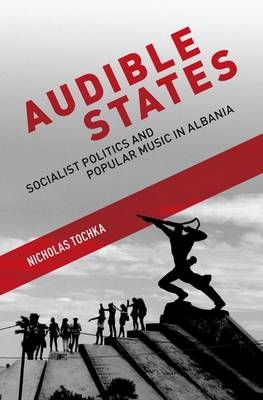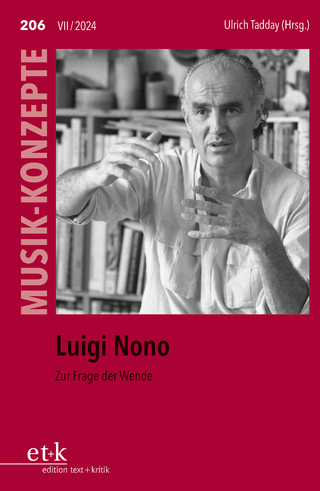
Audible States
Socialist Politics and Popular Music in Albania
Seiten
2017
Oxford University Press Inc (Verlag)
978-0-19-046781-4 (ISBN)
Oxford University Press Inc (Verlag)
978-0-19-046781-4 (ISBN)
During the heyday of Cold War cultural politics, state-sponsored performances of classical and popular music were central to the diplomatic agendas of the United States and the Soviet Union, while states on the periphery of the conflict often used state-funded performances to articulate their position in the polarized global network. In Albania in particular, the postwar government invested heavily in public performances, effectively creating a new genre of popular music: the wildly popular light music.
In Audible States: Socialist Politics and Popular Music in Albania, author Nicholas Tochka traces an aural history of Albania's government through a close examination of the development and reception of light music as it has long been broadcast at an annual song competition, Radio-Television Albania's Festival of Song. Drawing on a wide range of archival resources and over forty interviews with composers, lyricists, singers, and bureaucrats, Tochka describes how popular music became integral to governmental projects to improve society-and a major concern for both state-socialist and post-socialist regimes between 1945 and the present. Tochka's narrative begins in the immediate postwar period, arguing that state officials saw light music as a modernizing agent that would cultivate a cosmopolitan, rational populace. Interweaving archival research with ethnographic interviews, author Nicholas Tochka argues that modern political orders do not simply render social life visible, but also audible. As the Cold War thawed and communist states fell, the post-socialist government turned again to light music, now hoping that these musicians could help shape Albania into a capitalist, "European" state.
Incorporating insights from ethnomusicology, governmental studies, and post-socialist studies, Audible States presents an original perspective on music and government that reveals the fluid, pervasive, but ultimately limited nature of state power in the modern world. Tochka's project represents a nascent entry in a growing area of study in music scholarship that focuses on post-soviet Europe and popular musics. A remarkably researched and engagingly written study, Audible States is a foundational text in this area and will be of great interest for music scholars and graduate students interested in popular music, sound studies, and politics of the Cold War.
In Audible States: Socialist Politics and Popular Music in Albania, author Nicholas Tochka traces an aural history of Albania's government through a close examination of the development and reception of light music as it has long been broadcast at an annual song competition, Radio-Television Albania's Festival of Song. Drawing on a wide range of archival resources and over forty interviews with composers, lyricists, singers, and bureaucrats, Tochka describes how popular music became integral to governmental projects to improve society-and a major concern for both state-socialist and post-socialist regimes between 1945 and the present. Tochka's narrative begins in the immediate postwar period, arguing that state officials saw light music as a modernizing agent that would cultivate a cosmopolitan, rational populace. Interweaving archival research with ethnographic interviews, author Nicholas Tochka argues that modern political orders do not simply render social life visible, but also audible. As the Cold War thawed and communist states fell, the post-socialist government turned again to light music, now hoping that these musicians could help shape Albania into a capitalist, "European" state.
Incorporating insights from ethnomusicology, governmental studies, and post-socialist studies, Audible States presents an original perspective on music and government that reveals the fluid, pervasive, but ultimately limited nature of state power in the modern world. Tochka's project represents a nascent entry in a growing area of study in music scholarship that focuses on post-soviet Europe and popular musics. A remarkably researched and engagingly written study, Audible States is a foundational text in this area and will be of great interest for music scholars and graduate students interested in popular music, sound studies, and politics of the Cold War.
Nicholas Tochka is Visiting Assistant Professor of Ethnomusicology at the University of Maryland. A graduate of Stony Brook University and Hofstra University, his work integrates history and ethnography to explore how musicians and listeners make meaningful lives for themselves under modern political orders.
Table of Contents
Acknowledgments
List of Illustrations
Introduction
1 Administering Music
2 Debating Song
3 Cultivating Individuality
4 Voicing Transition
5 Promoting Albania
Epilogue: Hearing Like A State
Appendix: Research Materials
Notes
References
| Erscheinungsdatum | 04.12.2016 |
|---|---|
| Verlagsort | New York |
| Sprache | englisch |
| Maße | 239 x 160 mm |
| Gewicht | 624 g |
| Themenwelt | Kunst / Musik / Theater ► Musik ► Musiktheorie / Musiklehre |
| Kunst / Musik / Theater ► Musik ► Pop / Rock | |
| Geisteswissenschaften ► Geschichte ► Regional- / Ländergeschichte | |
| Sozialwissenschaften ► Politik / Verwaltung | |
| Sozialwissenschaften ► Soziologie | |
| ISBN-10 | 0-19-046781-9 / 0190467819 |
| ISBN-13 | 978-0-19-046781-4 / 9780190467814 |
| Zustand | Neuware |
| Haben Sie eine Frage zum Produkt? |
Mehr entdecken
aus dem Bereich
aus dem Bereich
Grundbegriffe, Harmonik, Formen, Instrumente
Buch | Softcover (2021)
Philipp Reclam (Verlag)
CHF 12,90
Jazz als Gegenkultur im westlichen Nachkriegsdeutschland
Buch | Hardcover (2024)
edition text + kritik (Verlag)
CHF 57,90


